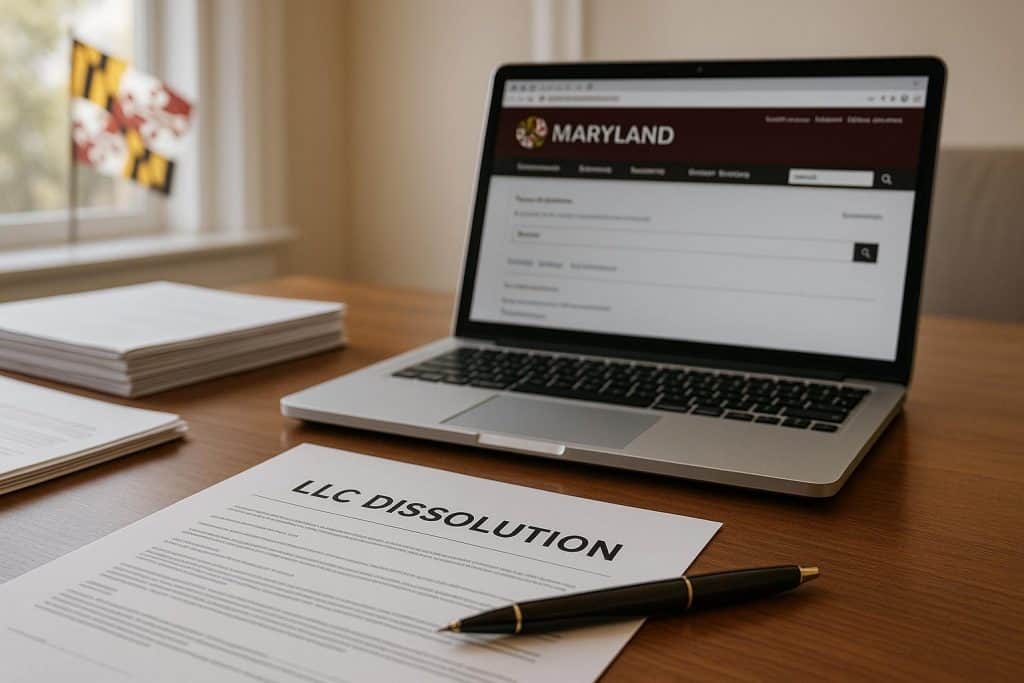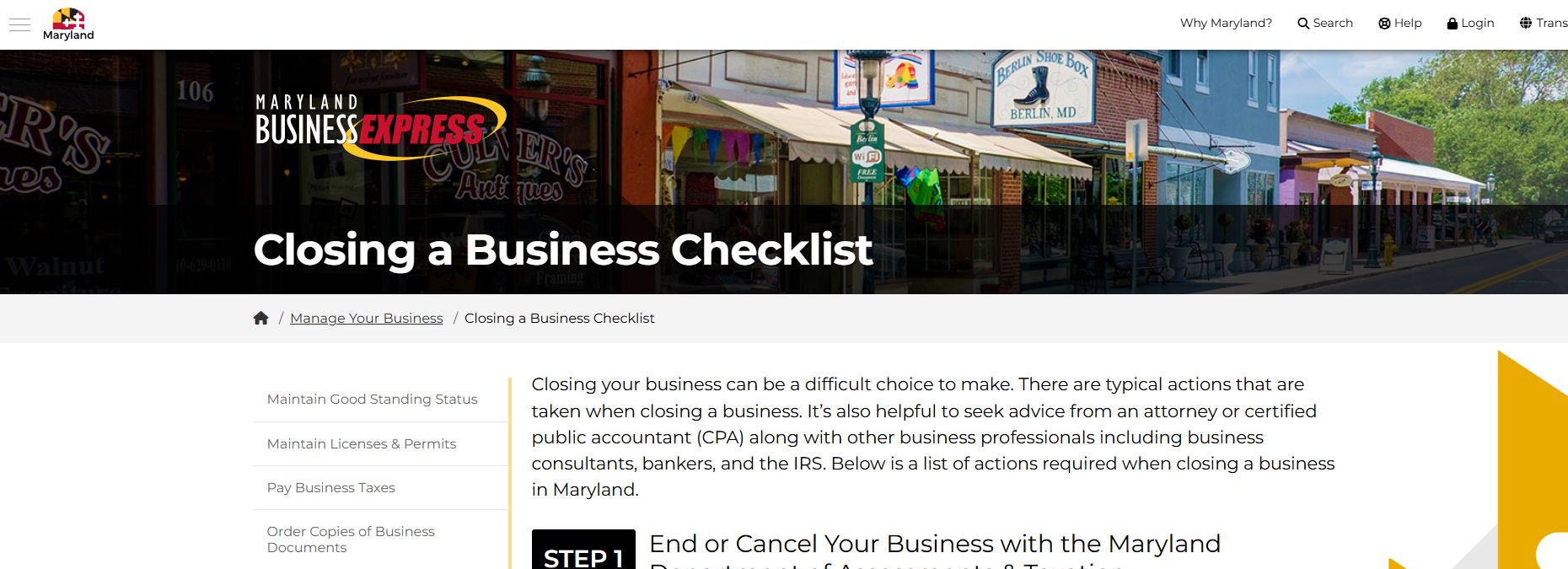To dissolve an LLC in Maryland, follow these steps to ensure you’re legally protected and avoid unnecessary fees or liabilities:
- Step 1: Review Your Operating Agreement
Check your LLC’s operating agreement for specific rules about dissolution, including voting requirements and procedures. - Step 2: Secure Member Approval
Hold a formal vote among members. If unanimous consent is required, document the decision in meeting minutes or a written consent form. - Step 3: Settle Debts & Notify Creditors
Pay off all outstanding debts, notify creditors in writing, and provide them with a timeframe to submit claims. - Step 4: Close Tax Accounts
File final tax returns with the IRS and Maryland Comptroller, and close any state tax accounts, such as sales/use tax or unemployment tax accounts. - Step 5: File Articles of Cancellation
Submit the Articles of Cancellation (Form LLC-4/7) to the Maryland State Department of Assessments and Taxation (SDAT). You can file online or by mail. - Step 6: Retain Records
Keep copies of all dissolution-related documents for at least seven years to protect yourself from future audits or claims.
Quick Overview of Dissolution Types:
| Type | Who Initiates | Common Reasons |
|---|---|---|
| Voluntary | LLC Members | Business decision, retirement, or change in direction |
| Administrative | Maryland SDAT | Non-compliance (e.g., missing reports or agent) |
| Judicial | Court Order | Legal disputes or misconduct |
Filing the Articles of Cancellation officially ends your LLC’s legal obligations. Without this step, your LLC remains active, and you may still owe annual fees and taxes. Acting promptly and following these steps ensures a smooth closure.
Preparing for LLC Dissolution
Before you begin the formal process of dissolving your LLC, it’s crucial to handle a few internal steps to ensure everything aligns with your operating guidelines. These steps set the stage for a smoother process and help avoid unnecessary complications.
Reviewing the LLC Operating Agreement
Your LLC’s operating agreement is the go-to document for guiding the dissolution process. It outlines the necessary steps, including how to secure member approval, notify creditors, distribute assets, and settle liabilities. Some agreements even specify a predetermined dissolution date or the exact number of votes needed to close the business. Sticking to these guidelines can help you avoid legal issues and keep the process on track.
If your LLC doesn’t have an operating agreement, Maryland’s LLC Act provides default rules to guide you. Still, having a written agreement makes things much clearer and easier to manage.
Pay close attention to any voting thresholds mentioned in the agreement. For LLCs with multiple members, unanimous consent is often required unless the agreement specifies an alternative method.
Getting Member Approval
In Maryland, member approval is a legal requirement for dissolving an LLC. The exact voting process depends on what’s outlined in your operating agreement. If no alternative provisions exist and your LLC has multiple members, unanimous consent is typically the default.
To formalize the decision, hold a meeting to vote on the dissolution. Document the outcome with detailed minutes or a written consent form. It’s important that all members fully understand what dissolution involves – timelines, financial obligations, and their individual responsibilities during the winding-up phase. If unanimous consent isn’t reached, refer to your operating agreement for alternative voting methods. In some cases, judicial intervention may be necessary if members cannot agree.
Be sure to record the vote in official minutes, as this documentation is often required for filing purposes. This meeting is also a good time to assign specific tasks, like notifying creditors, liquidating assets, or completing final tax filings. Once internal approvals are secured, you can shift your attention to resolving external financial and tax matters.
Settling Debts and Financial Obligations
Once members approve the decision to dissolve your LLC, the first priority is to settle all outstanding debts. This step is critical to avoid personal liability and is a necessary part of the state-mandated dissolution process. In Maryland, you cannot officially close your business until all debts are resolved.
Start by compiling a comprehensive list of creditors. Use your accounting records, bank statements, and contracts to ensure no one is overlooked. Before distributing any remaining assets to members, all debts must be paid in full.
If your LLC doesn’t have enough cash to cover its obligations, consider liquidating assets or negotiating written settlements. Failing to address unpaid debts could lead to legal action from creditors, potentially putting LLC members at risk for personal liability.
Closing Tax Accounts
Maryland requires businesses to close their tax accounts with both state and federal agencies as part of the dissolution process. The Comptroller of Maryland ensures that all tax returns, reports, and liabilities are up to date before accounts can be closed.
To close withholding and sales/use tax accounts, contact the Comptroller of Maryland. You can reach them at 410-260-7980 (Central Maryland) or 1-800-638-2937 (elsewhere) during business hours, Monday through Friday, 8:30 a.m. to 4:30 p.m. Have your business details, account number, reason for closing, and planned close date ready when you call.
Alternatively, you can complete the necessary forms. For withholding accounts, file Form MW506FR or use the Final Report Form in your withholding coupon booklet. For sales and use tax accounts, submit Form 202FR or the Final Report Form in your sales and use tax coupon booklet.
If your business had an unemployment tax account, close it by calling 410-949-0022 (Central Maryland) or 1-800-827-4839.
For specialized licenses, such as alcohol permits, tobacco licenses, or motor fuel accounts, send a written request on official letterhead to the Comptroller of Maryland. Be sure to include your account number and have the request signed by an officer, member, or partner. Mail the request, along with the original permit or license, to:
Comptroller of Maryland
Field Enforcement Division
Licensing and Registration Unit
P.O. Box 2999
Annapolis, MD 21404
On the federal side, consult the IRS Closing a Business Checklist to ensure all tax obligations are met. This includes filing final tax returns and, if necessary, closing your Employer Identification Number (EIN).
Notifying Creditors and Other Parties
Maryland law requires you to notify all creditors and claimants about your LLC’s dissolution. Sending written notices via registered mail is recommended, as it provides a clear record of compliance. Your notice should explain the reason for the dissolution, specify the timeframe for submitting claims (usually 120 days from the notice date), and include the address where claims should be sent.
Keep detailed records of all interactions with creditors. In addition to creditors, notify vendors, suppliers, landlords, insurance companies, and any other parties with ongoing business relationships. Clear communication can help avoid misunderstandings and potential legal disputes.
Don’t forget to inform employees as well. They should be made aware of the dissolution timeline, final paycheck details, benefits continuation, and their eligibility for unemployment insurance. Additionally, local and state licensing authorities must be notified, and any business licenses or permits should be formally canceled.
Once all debts are settled, tax accounts closed, and notifications completed, you can move forward with filing the necessary dissolution paperwork.
Filing the Articles of Cancellation
Once you’ve settled all debts and notified creditors, the next step is to formally dissolve your LLC in Maryland. This is done by filing the Articles of Cancellation, which officially informs the state that your business is closing for good. Submitting this document ends your LLC’s legal existence and halts obligations like annual fees.
Completing the Articles of Cancellation Form
To dissolve an LLC in Maryland, you’ll need to complete Form LLC-4/7, provided by the Maryland State Department of Assessments and Taxation (SDAT). The state requires specific details to process your request, so gathering the necessary information beforehand is crucial.
Here’s what you’ll need:
- The exact legal name of your LLC as it appears in your formation documents.
- Your LLC’s SDAT ID number.
- The physical address of your LLC in Maryland.
The form also asks for additional details to confirm compliance with dissolution procedures:
- The principal office address where your LLC conducted business.
- Information about a resident agent who will remain available for one year after the LLC is terminated.
- Identification of the members responsible for winding up the LLC’s affairs. If your operating agreement designates specific members for this role, include their names and addresses. Otherwise, list all members and their addresses.
You’ll also need to confirm that all known creditors have been notified about the dissolution. The form provides space to include any additional provisions relevant to the process.
Before submitting, double-check all details for accuracy. Errors in names, addresses, or other key information can delay processing or require resubmission. Additionally, make sure the form is signed by the authorized members or managers as outlined in your operating agreement.
Submission Process and Filing Fees
Once the form is complete, you can submit it using one of two methods: online or by mail.
- Online Filing: The fastest option is through the Maryland Business Express platform. This system walks you through the process, checks your information for errors, and provides immediate confirmation of receipt. Online filing is ideal if you need expedited processing.
- Mail Submission: If you prefer to file by mail, send the completed form to: Maryland Department of Assessments and Taxation
301 W. Preston Street, Room 801
Baltimore, MD 21201 Make checks payable to the State Department of Assessments and Taxation.
Here’s a breakdown of the processing times and fees:
- Standard Filing: 7–10 business days, no fee.
- Expedited Filing: 24–48 hours, $50 fee.
To avoid complications, submit your form at least 19 days before your desired termination date. This allows enough time for processing and for the state to update its records.
Once SDAT reviews and approves your submission, they’ll send you a confirmation of dissolution. Keep this document with your business records as proof that your LLC has been officially dissolved.
Failing to file the Articles of Cancellation leaves your LLC legally active, which means you could still be responsible for annual fees, taxes, and other liabilities. Filing this document is the final and essential step to officially close your business and protect yourself from future obligations.
sbb-itb-ba0a4be
Post-Dissolution Compliance and Record-Keeping
Filing the Articles of Cancellation is just the first step in wrapping up your LLC. To fully close your business and protect yourself from future liabilities, you’ll need to complete final tax filings and maintain organized records. Here’s what you need to know to ensure a smooth conclusion.
Final Tax Filings and Record Maintenance
Once the Articles of Cancellation are filed, your next priority is addressing federal and state tax obligations. Securing all dissolution-related documents and keeping them organized is equally important to avoid potential headaches down the road.
Federal Tax Requirements
To formally close your LLC’s federal tax accounts, file your final tax returns with the IRS. Be sure to check the box indicating it’s your LLC’s last return – this notifies the IRS that your business is no longer operational and prevents unnecessary follow-ups. Don’t forget to close your LLC’s Employer Identification Number (EIN) account with the IRS to complete the process.
Maryland State Tax Closure
At the state level, contact the Maryland Comptroller’s Office to close your withholding and Sales and Use Tax accounts. If your LLC held any specialized licenses, submit a written request to the relevant state office to cancel those permits.
Additionally, file any final reports required by the Maryland Department of Assessments and Taxation (SDAT). Skipping these steps could result in ongoing tax obligations or penalties, even if your LLC is officially dissolved.
Essential Record Retention
Keeping thorough records is crucial to protect yourself from future audits or legal disputes. Make sure to retain copies of all key documents related to your LLC’s dissolution, including:
- Articles of Cancellation and confirmation from SDAT
- Notifications sent to creditors and any responses received
- Final tax returns and correspondence with the IRS and Maryland Comptroller’s Office
- Member resolutions and meeting minutes documenting dissolution decisions
- Financial statements and records of asset distribution
It’s a good idea to store these records for at least seven years. Once everything is properly filed and archived, consider using virtual mail services to handle any remaining correspondence efficiently.
Using BusinessAnywhere for Post-Dissolution Support
Even after your LLC is dissolved, you might still receive mail from government agencies or creditors. A virtual mailbox service, like the one offered by BusinessAnywhere, can help you manage this correspondence with ease.
BusinessAnywhere provides unlimited scanning and storage for all critical documents, so you can access and respond to important messages from anywhere. Their compliance alerts keep you informed about any lingering obligations or deadlines, while a secure document management dashboard ensures all your dissolution records are organized and easily retrievable.
Mail forwarding is another helpful feature, allowing you to redirect essential correspondence to your attorney, accountant, or personal address. This ensures no important communication slips through the cracks.
If you’re an entrepreneur planning your next venture, BusinessAnywhere also offers tools for business registration, registered agent services, and ongoing compliance management. With 24/7 access, you can handle business matters on your schedule. Plus, their privacy protection features help keep your personal information secure during the transition away from your LLC structure.
Conclusion
Dissolving an LLC in Maryland involves several essential steps, starting with reviewing your operating agreement and obtaining member approval. From there, you’ll need to settle debts, close tax accounts, notify creditors, and file the Articles of Cancellation. This thorough process ensures that all legal and administrative obligations are addressed.
Taking the time to prepare properly can help you avoid lingering liabilities and potential legal complications. The Maryland Business Express website offers a detailed checklist to guide you through the dissolution process, making it easier to stay on track.
Filing the Articles of Cancellation marks the beginning of the final phase, which includes completing any remaining tax filings, keeping necessary records, and managing leftover correspondence. Be sure to retain all documents and confirmation notices for your records – they could prove useful down the road.
To simplify these last steps, consider using tools like BusinessAnywhere for document management and compliance support. Their virtual mailbox service, for instance, can help you stay on top of important correspondence from government agencies or creditors.
Whether you’re wrapping up your current LLC or preparing for new business ventures, having the right resources and support can make the process smoother and help you avoid costly errors. By adhering to Maryland’s specific requirements and leveraging helpful tools, you can ensure a seamless dissolution while protecting yourself from future risks.
FAQs
What happens if I don’t properly dissolve my LLC in Maryland?
If you don’t go through the proper steps to dissolve your LLC in Maryland, you could end up dealing with some serious legal and financial headaches. For one, your LLC might still be on the hook for outstanding debts, taxes, and fees, which can pile up over time. Even worse, skipping the formal dissolution process could strip away your limited liability protection, leaving you personally responsible for certain obligations.
There’s also the risk of the state stepping in to administratively dissolve your LLC. This can create complications if you plan to start new business ventures or handle any legal matters down the road. To steer clear of these problems, it’s crucial to handle everything correctly – this includes filing the required paperwork, paying off debts, and informing all necessary parties.
How do I notify creditors and settle claims when dissolving an LLC in Maryland?
When dissolving an LLC in Maryland, it’s crucial to notify all known creditors with written notices. These notices should clearly explain your LLC’s dissolution and include a specific deadline for submitting claims, as outlined by Maryland law. This ensures creditors have ample time to respond appropriately.
Before finalizing the dissolution, take the time to review your LLC’s financial records thoroughly. Settle any outstanding debts and address all liabilities. These steps are essential for avoiding potential legal or financial issues down the road and for meeting the state’s legal requirements.
What should I do if my LLC operating agreement doesn’t outline how to dissolve the business?
If your LLC operating agreement doesn’t spell out how to dissolve the business, you’ll need to follow Maryland’s default state rules. In most cases, this involves getting unanimous consent from all members or moving forward if the LLC has been without members for 90 consecutive days.
After meeting these requirements, you must file the Articles of Dissolution with the Maryland Department of Assessments and Taxation. This filing is essential to officially close your LLC and stay within state guidelines. Don’t forget to wrap up any loose ends – this includes paying off outstanding debts, informing necessary parties, and addressing final tax responsibilities to ensure everything is handled correctly.









